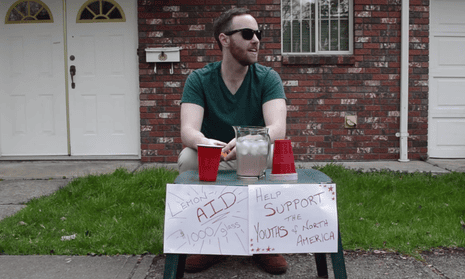“Hi. I’m just calling because I’m looking for some more information about helping or aiding the local youths of North America. I really hear that obesity is a huge problem over there ... ”
This is the opening line from the video If Voluntourists Talked About North America, a video launched last week to kick off the End Humanitarian Douchery campaign.
You’re kidding? Nope, this is a real campaign, with its own hashtag (#endhumanitariandouchery) and everything.
So who is a humanitarian douchebag? You probably know one. They’re likely to be in their early 20s, perhaps an unemployed graduate with a 2:1 in politics and international relations. They’re trying to decide whether they should get an MA in development or pay for another one of those almost as equally expensive build-a-school-in-Kenya-and-save-the-children programmes. They’ve just returned from teaching the English classics to illiterate women in Uganda and they won’t shut up about it. Oh and their Tinder profile looks like this.
I’m still not sure I could spot one. Do they have a checklist? Oh yes, they’ve got a helpful list called the seven sins of humanitarian douchery. It boils down to naughty volunteers who haven’t researched whether their organisation is ethical and committed to long-term sustainable development. They are volunteers who feel comfortable going abroad to do work they wouldn’t be qualified to do at home – stealing a local’s job in the process. Then there are the really bad ones, who are just in it for some messy nights out and the photo ops.
Sometimes the skills they offer simply don’t meet the needs ... “I’m thinking about teaching them Zumba for a few weeks, you know really make a difference.”
But surely most volunteers’ hearts are in the right place. They only want to make a difference, right? Well, that’s what Christina Guan and Kaelan MacNeill, the two millennials (and former serial volunteers) behind the campaign say: “We know voluntourists aren’t monsters and they’re not intentionally wreaking havoc.”
So what are these millennials trying to achieve? What started as a project for the two communications students has now gone a lot further than Simon Fraser University. After years of volunteering at home, both of the campaign’s founders were keen to do a placement overseas - but as MacNeill, who’s also worked in the tourism industry, puts it - “the more it seemed like a smoke and mirrors show”. Knowing they probably weren’t the only ones hesitant about committing big bucks to a programme that may not be helping, they’re aiming to crack down on irresponsible voluntourism by spreading the word about what separates a good placement from a bad placement.
They’ve got a series of online resources you can share with friends considering a placement abroad. They also want to encourage debate on the topic over social media using, you’ve guessed it, #endhumanitariandouchery.
Yes, but voluntourism’s not really a new concept. The question of whether volunteering abroad does more harm than good is an age-old one. VSO’s latest report that volunteers make a valuable, yet often understated, impact on sustainable development did not silence all the critics. Did you know it’s a $2bn industry?
Aid and social change shouldn’t be a commodity. Eureka, you’ve got it!
So how do we convince the kids? Well, you could try flipping things around and create a video called ... hmmm ... let’s say: If Voluntourists Talked About North America.
I think I’ve seen that! It’s got this great one-liner: “I even got on this optional excursion that’s going to let me go into Walmarts, that’s going to actually let me interact with real North Americans - yeah it’s so sick, bud.”
Aren’t they just making fun of naive, young volunteers? They’re keen to use humour to get their message across. However, there is also a more serious message: they want volunteers to practise fair trade learning.
Fair trade what? Like the bananas? Not quite, it’s a bit of jargon about creating self-aware volunteers who prioritise reciprocity in relationships with their host communities. They’ve got a useful toolkit for people who want to learn more about being responsible volunteers.
So how do I become a responsible volunteer then? You need to take time to do some proper research into who to volunteer with. Does your organisation have strong links with the community they claim to be working in? Are they transparent about how they’re spending any money you’re asked for upfront?
What will I do when I get there? This is also crucial. When applying, a good way of thinking about this is asking yourself: am I qualified to perform these tasks at home? If not, then you probably should not be doing them abroad.
Why? My friend Harry’s just come back from building a school with no prior experience and said it changed his life. Think about it like this: how would you feel if someone came from abroad and took your job? Because that’s what volunteers sometimes unwittingly do, take local jobs.
That does sound bad. So what can I do about ending humanitarian douchery? If you’re volunteering or know someone else who’s thinking of doing so, read and share the toolkit, so they can make informed decisions.
Do say: This campaign is about creating a global community that values equality. It seeks to shift the power structures of development from a perspective of privilege, which takes a top-down approach to one that looks at the service from eye level.
Don’t say: I’ve just come back from the best spring break ever. Did you see my Instagrams of me riding an elephant with this cute little orphan? I was like “gather round children, it’s time for a selfie.” It got like 200 likes!
Join our community of development professionals and humanitarians. Follow@GuardianGDP on Twitter.

Comments (…)
Sign in or create your Guardian account to join the discussion